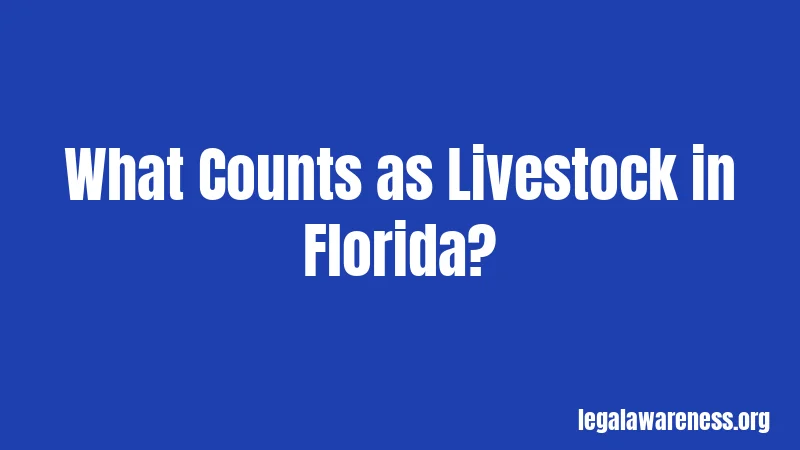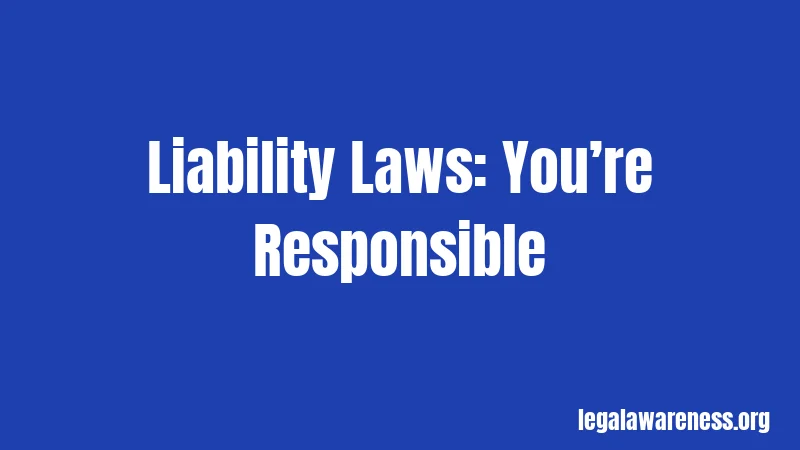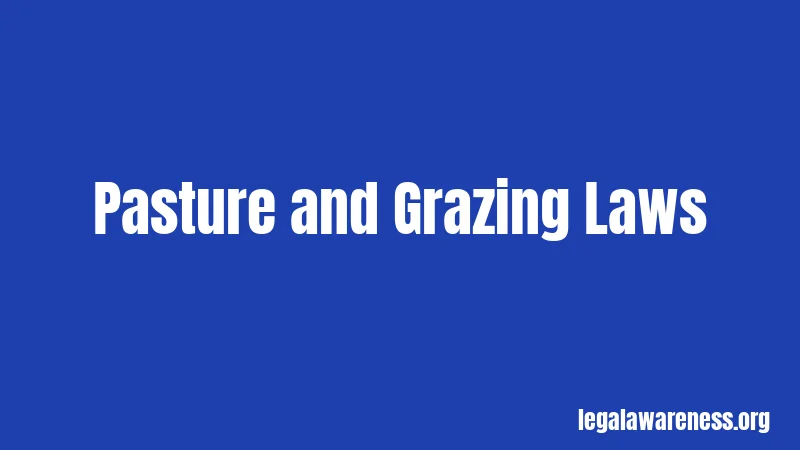Florida Livestock Laws (2026): Fencing, Liability, and Your Legal Responsibilities
Most people have no idea how strict Florida’s livestock laws actually are. Seriously. Whether you own a farm, keep animals as pets, or just live near livestock, you could get hit with hefty fines. Let’s break down exactly what you need to know to stay on the right side of Florida law.
The good news? These rules exist to protect you, your neighbors, and the animals themselves. Understanding them is actually simpler than you might think.
What Counts as Livestock in Florida?

Okay, first things first. What exactly is livestock in Florida? Here’s the deal.
Livestock includes cattle, horses, pigs, sheep, goats, and poultry. But it doesn’t stop there. Florida also counts bison, ostriches, emus, and llamas as livestock. Pretty straightforward, right?
The state also regulates exotic animals and captive wildlife. Basically, if it’s an animal you’re raising for profit or keeping in captivity, Florida probably has rules about it. This matters because different animals have different requirements.
Basic Fencing Requirements
Think of fencing rules like a traffic ticket—break them and you’ll pay. But these rules are actually designed to keep animals contained and safe.
In Florida, you must keep your livestock properly contained. This is the golden rule. You can’t just let animals roam freely on someone else’s property. If your animal damages a neighbor’s property, you’re liable. Yes, you’ll pay for it.
Your fencing must be strong enough to contain the type of animal you own. A fence that stops a chicken won’t stop a horse. Make sense? The fence needs to match the animal.
For cattle and horses, you need at least a 4-strand barbed wire fence or its equivalent. For smaller animals like goats, a 5-strand fence often works better. Hold on, this part is important: the fence must be in good repair. A broken fence is basically the same as no fence in Florida’s eyes.
Liability Laws: You’re Responsible

Here’s where it gets serious. In Florida, you’re financially responsible if your livestock damages someone’s property. This isn’t optional.
If your horse escapes and eats your neighbor’s garden, you pay for the damages. If your cattle destroy a fence, you pay to fix it. This is called “strict liability,” which means you’re responsible even if you didn’t do anything wrong. Your animal did the damage, so you’re on the hook.
Florida actually has a “fence law” worth knowing about. Basically, if you have livestock, you have a duty to fence them in properly. You’re not just responsible for damages your animals cause on your own property—you’re responsible for damages they cause on other properties too.
Wondering if this applies to you? If you own any livestock in Florida, this applies to you. Even one goat. Even chickens in your backyard.
Animal Control and Confinement Laws
Let’s talk about what Florida specifically requires for animal confinement. The state takes this seriously, and so should you.
Your livestock can’t roam free on public roads. If animal control finds your animals on a road or someone else’s property, they can impound them. You’ll then pay impound fees to get them back. Those fees add up fast.
Horses are especially regulated. In Florida, horses must be kept in secure enclosures. They can’t just hang out in a pasture with a flimsy fence. The enclosure must be appropriate for the horse’s size and breed.
Cattle have similar rules. They need adequate space and secure fencing. Florida law doesn’t specify exactly how many acres you need per animal, but you must provide enough space for the animal to move around naturally.
Pasture and Grazing Laws

Here’s something most people get wrong about pasture requirements. It’s not complicated, honestly.
Your pasture must have adequate water and food sources. This sounds basic, but it’s legally required. If an inspector finds your animals malnourished or without water, you’re violating the law.
You can’t use someone else’s pasture without permission. Trespassing with livestock is the same crime as regular trespassing—but potentially with extra consequences since the animals are involved.
If you border a neighbor’s property, your animals must stay on your side. Seriously. Your fence is your responsibility. If your animals keep getting onto your neighbor’s land, fix the fence or face legal trouble.
Health and Vaccination Requirements
Florida requires certain vaccinations and health certificates for livestock. This protects public health and the health of other animals.
For cattle, you need a brucellosis vaccination or test results. For horses, you need proof of current coggins testing (a disease test). These aren’t optional—they’re legally required.
If you transport livestock across state lines, you need health certificates. Even moving animals within Florida sometimes requires documentation. When in doubt, check with the Florida Department of Agriculture first.
Stay with me here. Diseases spread fast in livestock populations. That’s why these requirements exist. Breaking them can mean criminal charges, not just fines.
Poultry and Backyard Chicken Laws
Backyard chickens are popular in Florida. But here’s what you need to know before you get any.
Cities and counties have different rules about backyard poultry. Some allow up to 6 chickens. Others allow none. You must check your local city or county ordinances before getting chickens.
Many cities require that poultry be kept in enclosures. Not everyone loves the sounds and smells of chickens next door. Your neighbors have rights too.
If you keep chickens, you need a secure coop. Predators will attack loose birds. Plus, loose chickens in a residential area? That can violate local laws.
Roosters are often specifically banned in residential areas. The noise gets complaints fast. Check with your city before you get one.
Exotic and Captive Wildlife Laws
Okay, pause. This part is really important. Florida has strict rules about exotic animals.
You can’t keep wild animals as livestock without a special permit. Alligators, bears, big cats—these require special licenses and facilities. If you’re thinking about keeping an exotic animal, the licensing process is extensive.
Florida doesn’t just let anyone raise exotic livestock. You need to demonstrate proper expertise, facilities, and care. The state takes this incredibly seriously.
Emus, ostriches, and rheas need specific permits in some counties. What’s allowed in one county might be illegal in another. Always check with your county’s animal control office first.
Fencing and Property Lines
Now, here’s where things get interesting. Your fence can’t cross your neighbor’s property line.
If your fence is on the property line, you both own it technically. This means your neighbor shares maintenance costs. Yep, that’s the law. But honestly, this is the part most people miss when building fences.
If you build a fence entirely on your property, you own it completely. You pay for all maintenance. This is actually simpler legally, even if it costs more upfront.
Not sure what counts as a violation? A surveyor can help you determine exact property lines. It’s worth the money to get it right before you build.
Penalties and Consequences
Let’s talk about what happens when you break Florida livestock laws. The penalties aren’t light.
Violating livestock confinement laws can cost you $500 to $5,000 in fines. For repeated violations, the fines go higher. You could also face criminal charges.
If your livestock damages someone’s property, you’re paying for repairs—in addition to any fines. This is separate from criminal penalties. So you could face fines AND civil liability.
Failure to properly vaccinate or test livestock can result in fines up to $1,000. Your animals could be quarantined. You might not be able to move them or sell them.
Operating without proper permits for exotic animals is serious. You could face fines over $1,000 and even jail time for serious violations. It gets better: your animals will likely be confiscated.
Think of it like this. One mistake could cost thousands of dollars. Multiple mistakes? You’re looking at serious criminal charges.
Special Circumstances and Exceptions
Are there any exceptions to these rules? Sure, a few.
Agricultural land has different regulations than residential areas. If you’re on proper agricultural zoning, some rules change. But honestly, you still need to follow confinement and liability laws.
If you’re raising livestock for personal consumption, the rules still apply. Backyard farming is getting popular. But legality varies by location.
Native animals like native cattle breeds sometimes have special provisions. Still, you need proper documentation and licensing.
How to Comply with Florida Livestock Laws
Okay, here’s what you actually need to do. Step by step.
First, check your local city or county regulations. State law is the baseline, but your area might have stricter rules. Call your county animal control office—they’ll tell you exactly what you need.
Second, get proper fencing before you get animals. Seriously. Don’t put animals on property with bad fencing. You’re setting yourself up for liability.
Third, get any required health certificates and vaccinations. Your veterinarian can help. This usually isn’t expensive, but it’s legally mandatory.
Fourth, if you’re getting exotic animals or unusual livestock, get your permits first. Don’t get the animals and then try to get permits. That’s backwards and probably illegal.
Fifth, document everything. Keep vaccination records. Keep health certificates. If something goes wrong, documentation protects you.
If you’re unsure about anything, consult an agricultural attorney. Yes, these exist. They’re worth the money if you’re serious about raising livestock.
Recent Changes and Updates
Florida has tightened some of its exotic animal regulations in recent years. The state’s been more strict about permitting and enclosure requirements.
In 2023-2024, several counties strengthened backyard poultry ordinances. Some areas that previously allowed chickens now don’t. Check your local regulations—they might have changed.
Climate change has affected some livestock regulations too. Florida’s focus on water availability and pasture management has increased. Drought conditions have made authorities stricter about water access for animals.
Frequently Asked Questions
Can I have a horse in my backyard in Florida? Only if your property is zoned for livestock and you have proper fencing. Most residential areas don’t allow horses. Check with your city or county first.
What happens if my neighbor’s livestock damages my property? Your neighbor is liable for damages. You can sue them for repair costs. The neighbor’s homeowner’s insurance might cover it too.
Do I need insurance if I own livestock? Farm liability insurance is highly recommended. It covers damages your animals cause. Many lenders require it if you have a mortgage.
Can I breed livestock commercially in Florida? Yes, but you need proper licensing and zoning. Contact the Florida Department of Agriculture for specific requirements for your animal type.
What if someone gets hurt by my livestock? You could face serious liability lawsuits. If someone is injured by your animal on your property, you might still be liable depending on the situation. This is another reason liability insurance matters.
Do I need a permit for backyard chickens? It depends on your city or county. Some require permits. Others just require compliance with certain rules. Always check locally.
What’s the difference between livestock and pets? Legally, livestock are animals raised for profit or food. Pets are companions. But Florida law sometimes blurs these lines. When in doubt, check with your local government.
Can I shoot an animal that threatens my livestock? Florida allows self-defense of property. But the rules are specific. It’s not a blank check. Consult with animal control or a lawyer before doing this.
Final Thoughts
Now you know the basics of Florida livestock laws. Here’s the honest truth: most violations happen because people didn’t check local regulations first. Don’t be that person.
Before you get any livestock, make one phone call to your county’s animal control office. Seriously, one call. It takes 10 minutes and could save you thousands in fines and legal trouble.
If you’re already raising animals, review your current setup. Does your fencing match state requirements? Do you have proper documentation? Have you checked local ordinances recently?
Stay informed, stay safe, and when in doubt, ask a lawyer or your county government. It’s that simple. Good luck with your animals, and thanks for keeping Florida safe and responsible.
